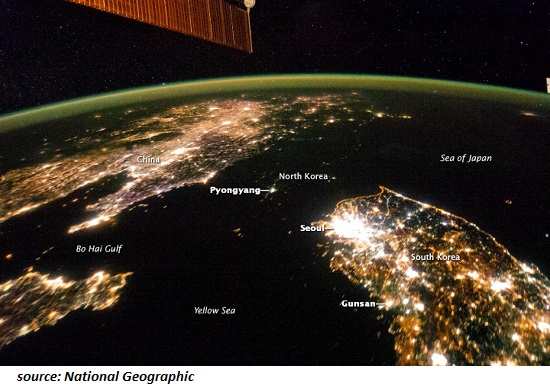The decision to launch nuclear weapons is political, not military.
There are undoubtedly two sets of operational plans: one deploying conventional weapons, and the second for deployment of nuclear weapons.
Nothing personal, Mr. Kim Jong Un, it's just business. A core duty of planners in the Pentagon is to ask "What if" and draw up a range of scenarios and operational plans to carry out the civilian leadership's policies and decisions.
One such scenario is "what if North Korea launches a ballistic missile that is tracking to strike U.S. territory?"
One response option in this scenario would be to wait and see if the North Korean missile hits the U.S. and if it is armed with a nuclear weapon, and if so, if the warhead detonates.
Another option is to respond immediately with a nuclear strike that neutralizes North Korea's ability to launch any more nuclear-armed missiles.
The U.S. Armed Forces does not declare war or make the decision to launch a nuclear strike--that is the prerogative and responsibility of the nation's civilian elected leadership. The duty of the U.S. Armed Forces is to be prepared to execute the decisions and policies of the elected civilian leadership.
The ethical considerations of such a decision are not the Pentagon's purview--those considerations rest with the elected civilian leadership. If North Korea is poised to kill 2 million Americans, South Koreans, Japanese, etc., then isn't erasing North Korea's capability to kill millions at the cost of 50,000 North Korean lives in a limited nuclear strike the more ethical choice?
Those considerations are not part of operational plans. The purpose of operational plans is to get the assigned job done. Limiting civilian casualties might well be part of the assigned mission. But it's not the Pentagon planners' job to make those mission decisions.
There are no small nuclear explosions, but there are smaller explosions and variations that have profoundly different consequences. Ground-burst detonations carve out craters and send shock waves through the earth that crumple tunnels, bunkers, elevator shafts, etc. Ground-burst detonations generate vast quantities of radioactive particles. Since it's well known that North Korea has buried its most precious nuclear resources deep underground, ground-burst detonations would be the only way to disrupt the access routes to bunkers deep underground.
Air-burst nuclear detonations generate field effects, i.e. electromagnetic pulses across the spectrum. These can be "tuned" to some degree. Thus a neutron-type weapon is designed to sicken and kill enemy soldiers while leaving buildings and equipment intact. This might be the weapon of choice to neutralize any attempt by the North Korean Army to launch a devastating artillery attack on South Korea in retaliation for the destruction of North Korea's missile and nuclear capabilities.
Air-burst field effects often include massive disruption of electronic equipment. This might limit the operational plans for air-burst nuclear detonations near the DMZ, as technologically advanced South Korea might well suffer significant economic losses from an air burst near the border with North Korea.
By the same token, an air-burst nuclear detonation over North Korean military communications headquarters might be considered essential to disrupt the North Koreans' command and control capabilities.
My point here is that operational plans to decapitate North Korean nuclear and ICBM capabilities exist and are constantly being revised and refined in light of new intelligence. It's not the planners' job to make the geopolitical or ethical calculations that inform such a drastic decision. It's the planners' job to make sure a strike ordered by the elected civilian leadership of the nation achieves its goal, i.e. eliminates North Korea's nuclear and missile delivery capabilities completely.
It's easy to say nuclear weapons should never be used, but what if conventional weapons can't do the job, or create greater risks? Would you consider it a good ethical trade-off to wait for millions to die before killing thousands? That's a political choice, and one that will always be second-guessed or disputed. But making such decisions is the purpose of elected civilian government.
The planners job is much more direct. If the elected civilian government orders the neutralization of North Korea's ability to kill millions of civilians in South Korea, Japan or the U.S., then the job boils down to aligning existing resources and reckoning how many resources will be needed to get the job done in the most effective way available.
A conventional-weapons strike would likely require hundreds (and possibly thousands) of aircraft sorties, and all that such a monumental effort entails. It would also requires a significant amount of time to execute. A nuclear strike requires far fewer resources but has consequences far beyond those of conventional weapons.
There have been no nuclear weapons detonated with the express intention of destroying civilians since 1945. The stakes are high, and nobody wants to launch a nuclear attack unless it is in retaliation for a nuclear attack. But by then it's too late to save the millions killed by the initial attack.
We all hope deterrence works. But deterrence very nearly failed a number of times in the Cold War between the USSR and the US. Given the possibility that deterrence might fail--over-ridden by a commander with launch authority, or a dozen other possibilities of miscalculation or impulse-- plans must be made for a first-strike designed to neutralize a nuclear missile capability.
The decision to launch nuclear weapons is political, not military--but achieving the goal is the duty of the military.
NOTE: Contributions/subscriptions are acknowledged in the order received. Your name and email remain confidential and will not be given to any other individual, company or agency.
Thank you, Patrick Y. ($5/month), for your splendidly generous pledge to this site -- I am greatly honored by your support and readership.
| |
Thank you, Jay S. ($5/month), for your superbly generous pledge to this site -- I am greatly honored by your support and readership.
|




























